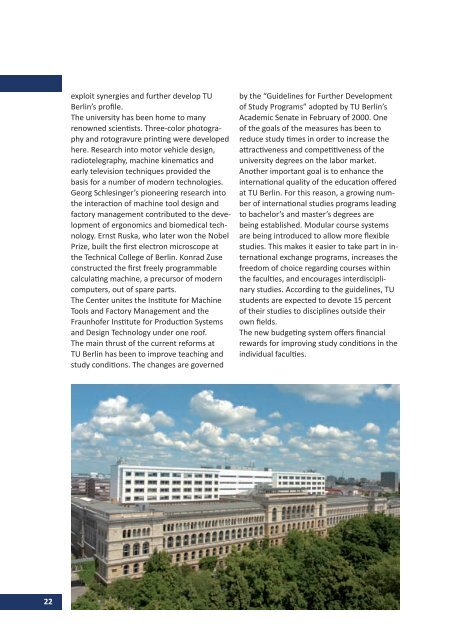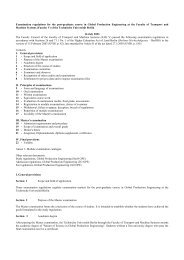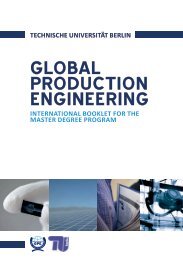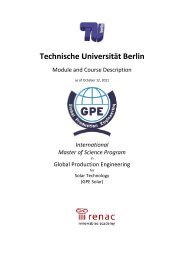Why BerlIn - Global Production Engineering - TU Berlin
Why BerlIn - Global Production Engineering - TU Berlin
Why BerlIn - Global Production Engineering - TU Berlin
You also want an ePaper? Increase the reach of your titles
YUMPU automatically turns print PDFs into web optimized ePapers that Google loves.
exploit synergies and further develop <strong>TU</strong><br />
<strong>Berlin</strong>’s profile.<br />
The university has been home to many<br />
renowned scientists. Three-color photography<br />
and rotogravure printing were developed<br />
here. Research into motor vehicle design,<br />
radiotelegraphy, machine kinematics and<br />
early television techniques provided the<br />
basis for a number of modern technologies.<br />
Georg Schlesinger’s pioneering research into<br />
the interaction of machine tool design and<br />
factory management contributed to the development<br />
of ergonomics and biomedical technology.<br />
Ernst Ruska, who later won the Nobel<br />
Prize, built the first electron microscope at<br />
the Technical College of <strong>Berlin</strong>. Konrad Zuse<br />
constructed the first freely programmable<br />
calculating machine, a precursor of modern<br />
computers, out of spare parts.<br />
The Center unites the Institute for Machine<br />
Tools and Factory Management and the<br />
Fraunhofer Institute for <strong>Production</strong> Systems<br />
and Design Technology under one roof.<br />
The main thrust of the current reforms at<br />
<strong>TU</strong> <strong>Berlin</strong> has been to improve teaching and<br />
study conditions. The changes are governed<br />
by the “Guidelines for Further Development<br />
of Study Programs” adopted by <strong>TU</strong> <strong>Berlin</strong>’s<br />
Academic Senate in February of 2000. One<br />
of the goals of the measures has been to<br />
reduce study times in order to increase the<br />
attractiveness and competitiveness of the<br />
university degrees on the labor market.<br />
Another important goal is to enhance the<br />
international quality of the education offered<br />
at <strong>TU</strong> <strong>Berlin</strong>. For this reason, a growing number<br />
of international studies programs leading<br />
to bachelor’s and master’s degrees are<br />
being established. Modular course systems<br />
are being introduced to allow more flexible<br />
studies. This makes it easier to take part in international<br />
exchange programs, increases the<br />
freedom of choice regarding courses within<br />
the faculties, and encourages interdisciplinary<br />
studies. According to the guidelines, <strong>TU</strong><br />
students are expected to devote 15 percent<br />
of their studies to disciplines outside their<br />
own fields.<br />
The new budgeting system offers financial<br />
rewards for improving study conditions in the<br />
individual faculties.<br />
22







